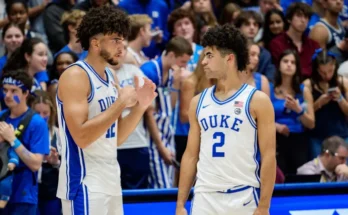Tennessee’s Season Ends in Arkansas: Pitching Staff’s Uncharacteristic Struggles Undermine Omaha Dreams in Decisive Super Regional Loss.
The Tennessee Volunteers’ season came to an abrupt end in the Fayetteville Super Regional, succumbing to a powerful Arkansas Razorbacks team in an 11-4 loss that saw the Vols’ vaunted pitching staff uncharacteristically falter under pressure. This defeat marked a disappointing conclusion to a season that, despite its challenges, had promised a deeper run into the College World Series. The struggles on the mound were the undeniable takeaway from this critical game, as a staff known for its formidable presence found itself unable to contain the Razorbacks’ relentless offense when it mattered most.
The pivotal moment arrived in the fourth inning, a frame that unravelled with a swift and brutal efficiency, ultimately sealing Tennessee’s fate. Starting pitcher Liam Doyle, a Golden Spikes Award finalist and the SEC Pitcher of the Year, entered the game with a reputation for dominance. His season record of 10-3 and an ERA of 2.84, alongside 158 strikeouts, spoke volumes about his usual command and ability to stifle opposing lineups. However, the Razorbacks seemed to have Doyle’s number in this matchup, a recurring theme this season, as two of his four losses on the year came against Arkansas. In this crucial Super Regional showdown, Doyle lasted just 3.2 innings, surrendering five runs on five hits, tied for his shortest outing of the season.
The inning began innocently enough for Arkansas with a leadoff single. Doyle, attempting to navigate the Razorback lineup, then allowed another single, putting runners on first and second. While he managed a crucial strikeout for the second out, a wild pitch then allowed the runners to advance, setting the stage for a strategic, yet ultimately disastrous, intentional walk. With first base open, head coach Tony Vitello made the decision to intentionally walk Charles Davalan, loading the bases for Brayden Krenzel, the freshman righty, who was brought in from the bullpen to face the heart of the Arkansas order.
Krenzel, facing SEC Player of the Year Wehiwa Aloy, initially worked ahead in the count. However, the pressure mounted, and a wild pitch allowed a run to score from third, further compounding Tennessee’s woes. This unforced error underscored the fragility of the pitching staff in this high-stakes environment. Another hit-by-pitch reloaded the bases, prompting Vitello to make yet another pitching change. The ball was handed to junior right-hander AJ Russell, a pitcher known for his potential and who had recently started to round into form. Russell quickly got ahead 0-2 against Logan Maxwell, the Arkansas right fielder. With the count in his favor, Russell threw what he later described as a well-spun fastball. However, in the high-pressure cooker of a Super Regional, what might have been a routine fly out on another day became a game-changing grand slam. Maxwell’s 13th homer of the season barely cleared the left-field fence, landing in the Tennessee bullpen, and transforming a tenuous 2-1 lead for Arkansas into a commanding 7-1 advantage. This single swing was the definitive blow, a five-run fourth inning that rendered the Volunteers’ chances of a comeback increasingly slim.
The struggles, however, were not confined to Doyle and the immediate aftermath of his departure. The collective performance of the Tennessee bullpen was a narrative of missed opportunities and an inability to stem the tide. While AJ Russell, despite giving up the grand slam, did manage to put together a relatively successful relief appearance overall, allowing only one run on one hit over 2.1 innings, the overall picture was one of inconsistency. Sophomore lefty Dylan Loy was also effective in his 2.1 innings out of the bullpen, surrendering just a single run on two hits. However, other relievers, including Nate Snead, Brandon Arvidson, and Tanner Franklin, also saw earned runs pinned to their names in their brief appearances, collectively contributing to the Razorbacks’ offensive explosion. The sum of these parts was a pitching display that simply couldn’t match the standard Tennessee had set for itself throughout the season.
Coach Vitello, visibly disappointed after the game, acknowledged the respect he had for the Arkansas program while offering a poignant apology to the Tennessee fanbase for not making it to Omaha. His reflections on the season, however, hinted at the weight of expectations and the fine margins that define success at this level. He spoke of the team’s potential, a word he deemed “vague,” but also of where they fell short in critical series against the nation’s best teams. The team’s strong winning percentage and their status as a national champion in the prior year underscored the inherent difficulty of repeating such a feat, especially in a season marked by parity in college baseball.
The context of this loss extends beyond a single game. Liam Doyle’s recurring difficulties against Arkansas were a known factor, dating back to a regular-season encounter where he also struggled significantly. Vitello alluded to the taxing nature of the Knoxville Regional, specifically mentioning Doyle’s save on short rest in the decisive Game 7 against Wake Forest. While acknowledging the memorable and special nature of that regional victory, he suggested that the cumulative toll might have impacted Doyle’s performance against Arkansas. This speaks to the grueling nature of the college baseball postseason and the delicate balance between pushing star pitchers and preserving their effectiveness. The missed spots, particularly balls left arm-side to left-handed batters, were a technical manifestation of the physical and mental fatigue.
Furthermore, the overall approach of the Tennessee pitching staff, particularly in critical counts, was highlighted as a recurring issue. The tendency to throw “meaty” pitches on 0-2 and 1-2 counts, even against a dynamic lineup like Arkansas’, proved costly throughout the season. These pitches, often middle-middle, are precisely what elite hitters capitalize on, and the Razorbacks demonstrated this vulnerability with ruthless efficiency. While the Tennessee offense showed glimpses of life in the later innings, collecting eight hits, it was largely overshadowed by the pitching staff’s inability to keep the game within reach. The grand slam by Logan Maxwell, in particular, served as a stark reminder of how quickly a close game can spiral when command and execution waver.
Ultimately, the season-ending loss to Arkansas, driven by the struggles of the Tennessee pitching staff, is a bitter pill for a program accustomed to deep postseason runs. It underscores the unforgiving nature of championship baseball, where even the slightest missteps can be severely punished. While the Volunteers can reflect on another successful season under Tony Vitello, marked by a sixth consecutive 40-win campaign and a fifth straight Super Regional appearance, the immediate sting of this defeat will undoubtedly linger. The takeaways are clear: in the crucible of postseason play, even the most talented pitching staffs must perform at their absolute peak, demonstrating consistent command, precision, and the ability to minimize damage when facing an opponent as potent as the Arkansas Razorbacks. The lessons learned from this season-ending struggle on the mound will undoubtedly fuel the Volunteers’ drive for improvement in seasons to come, as they aim to return to Omaha and claim another national title.



